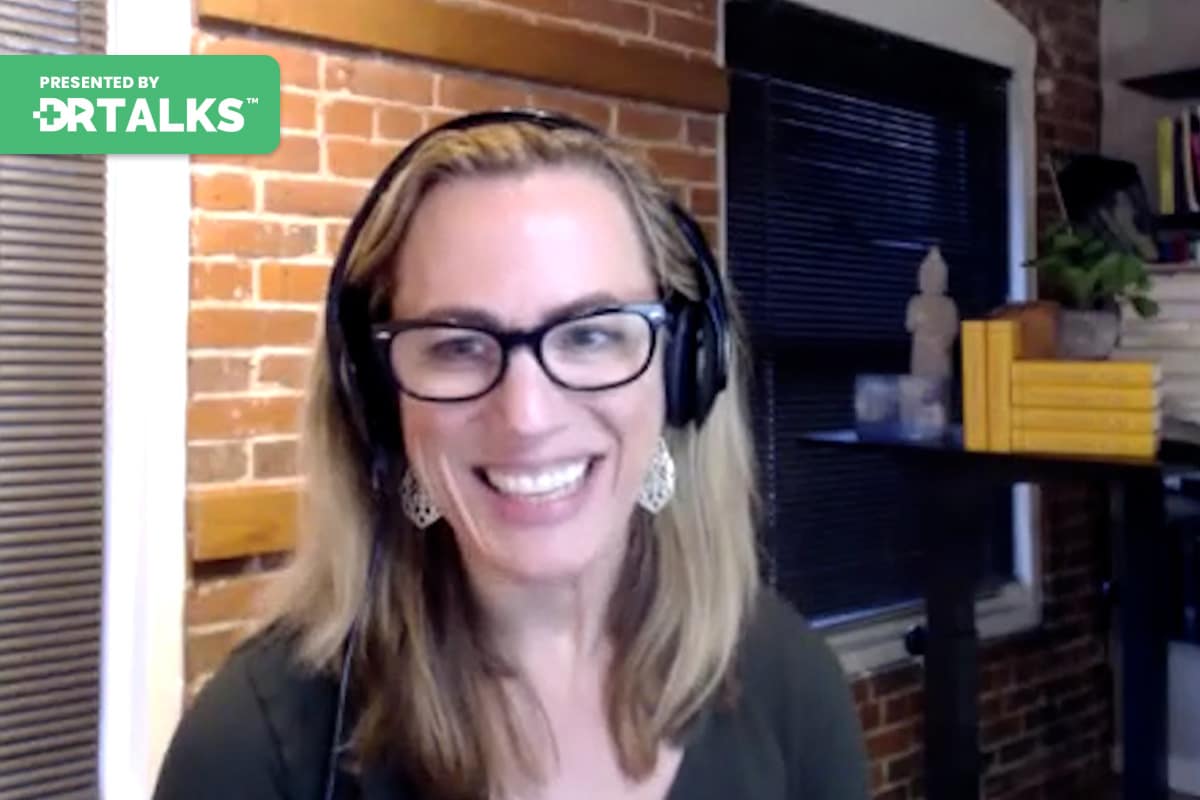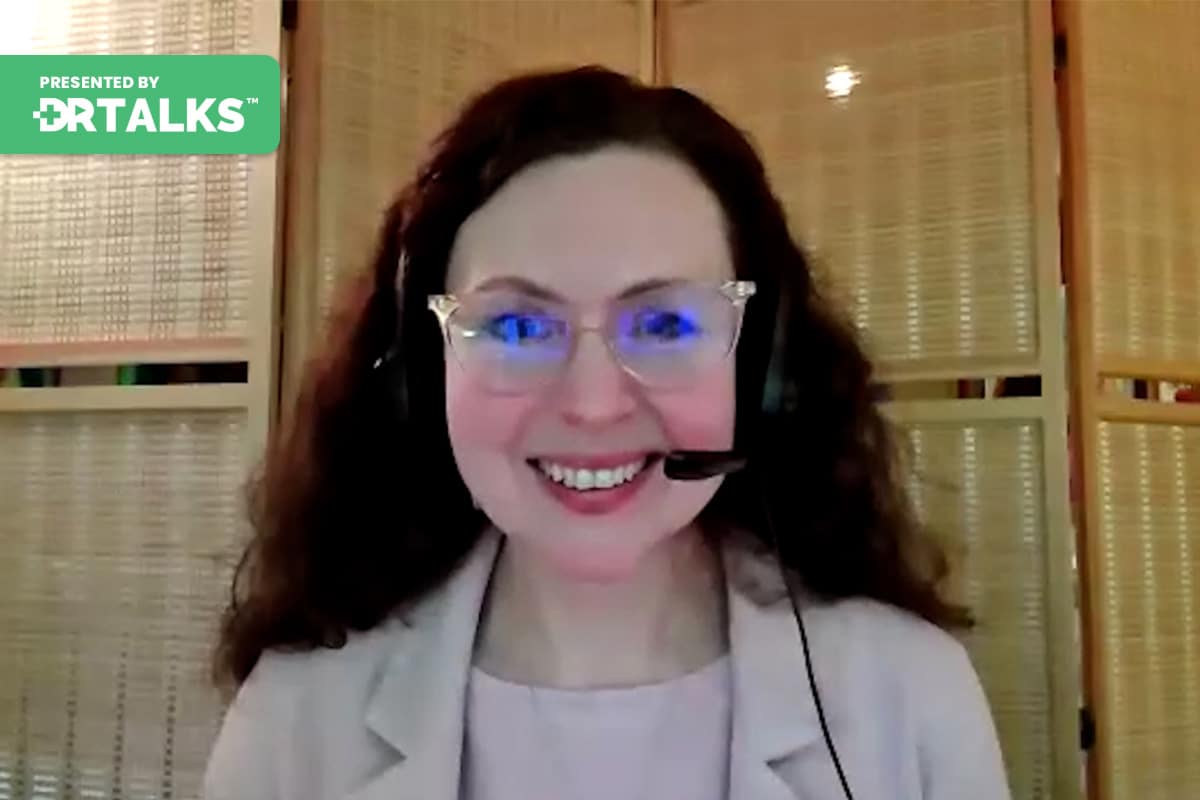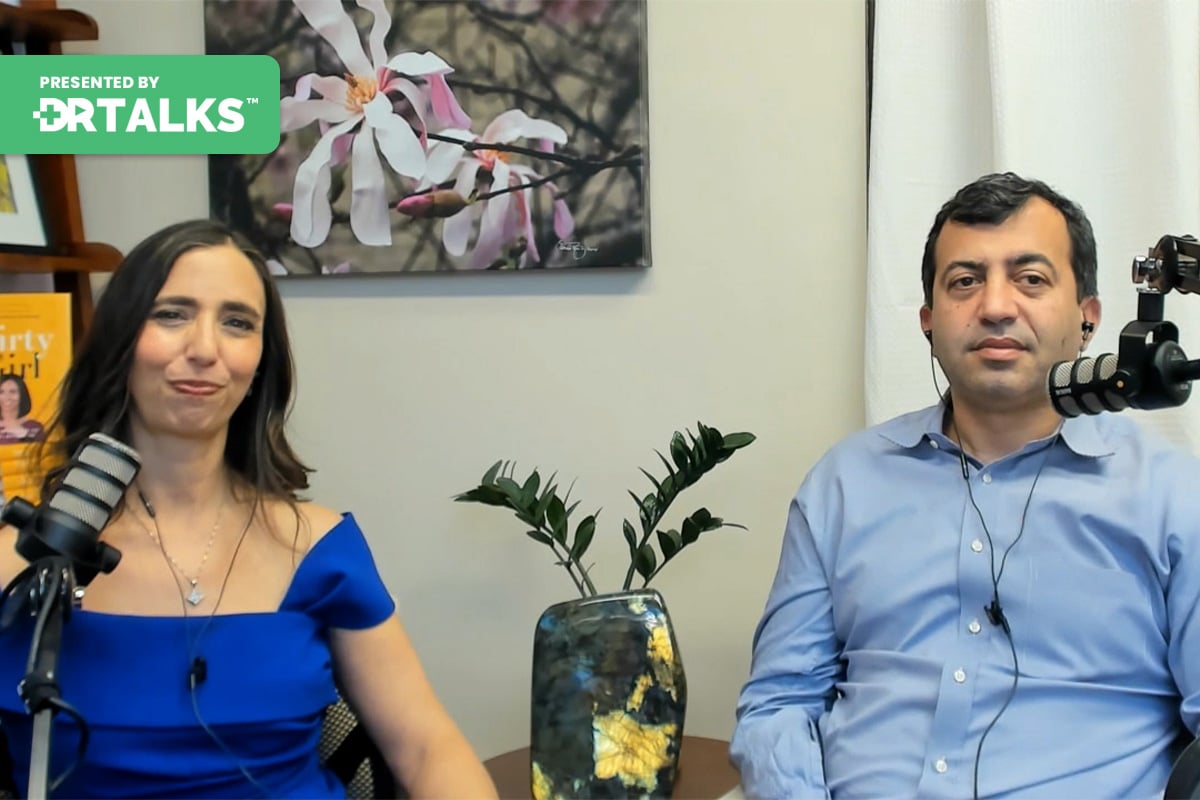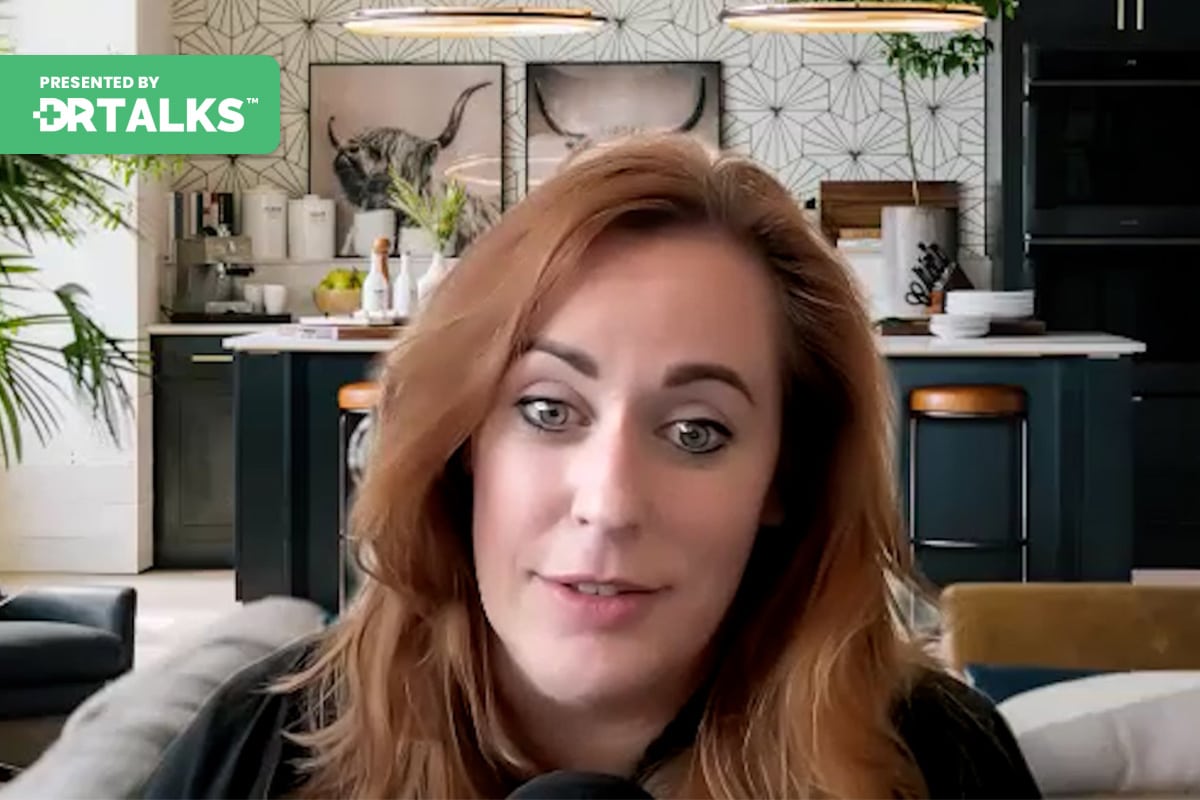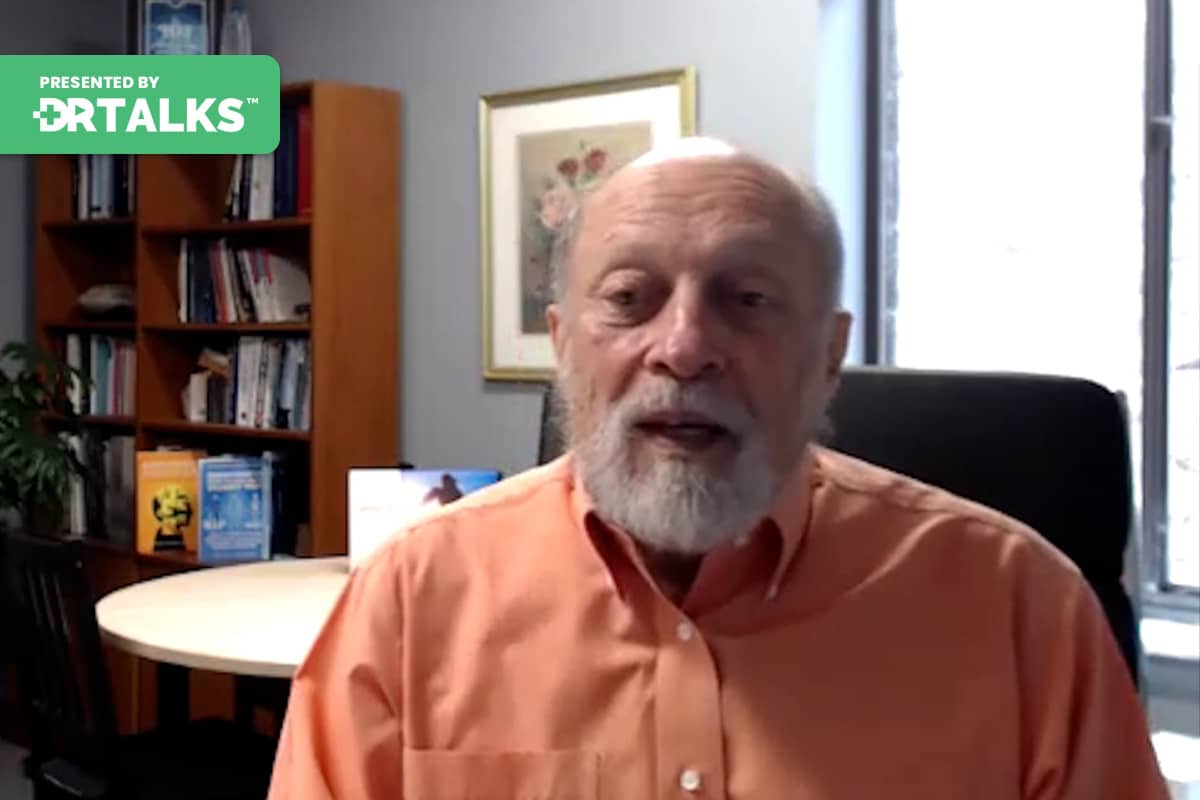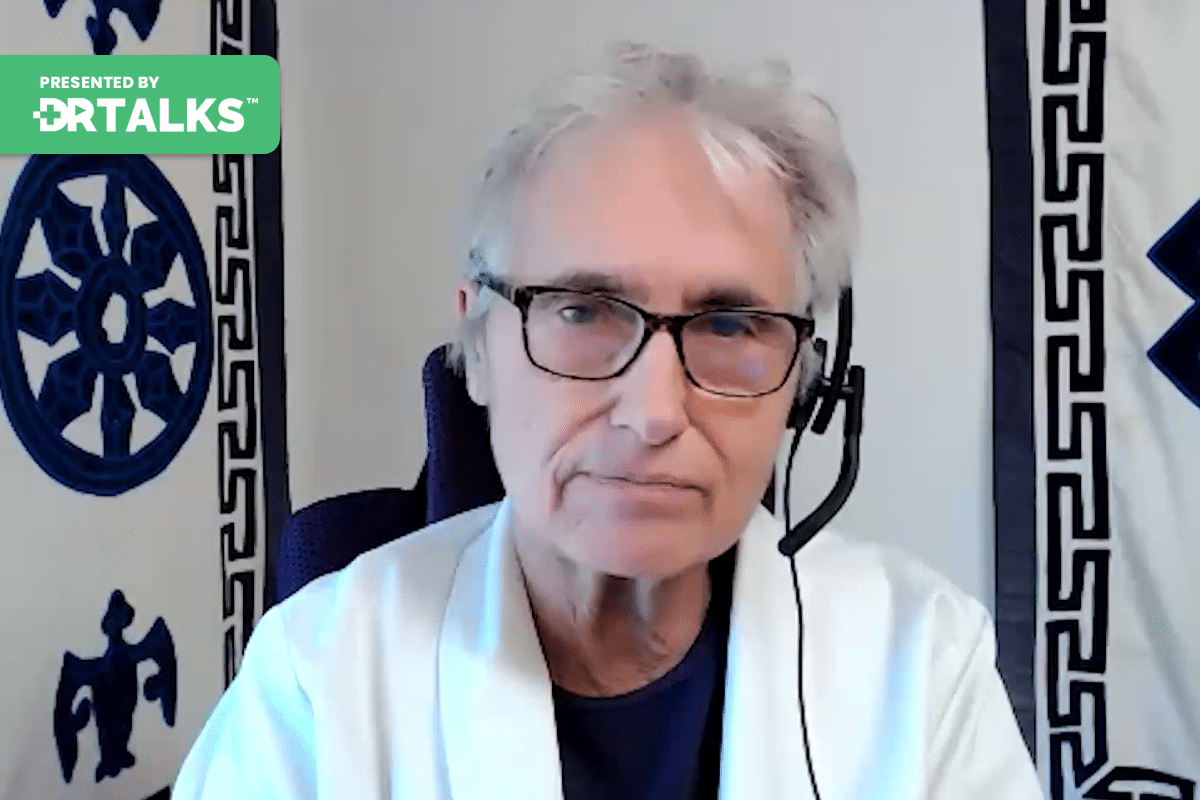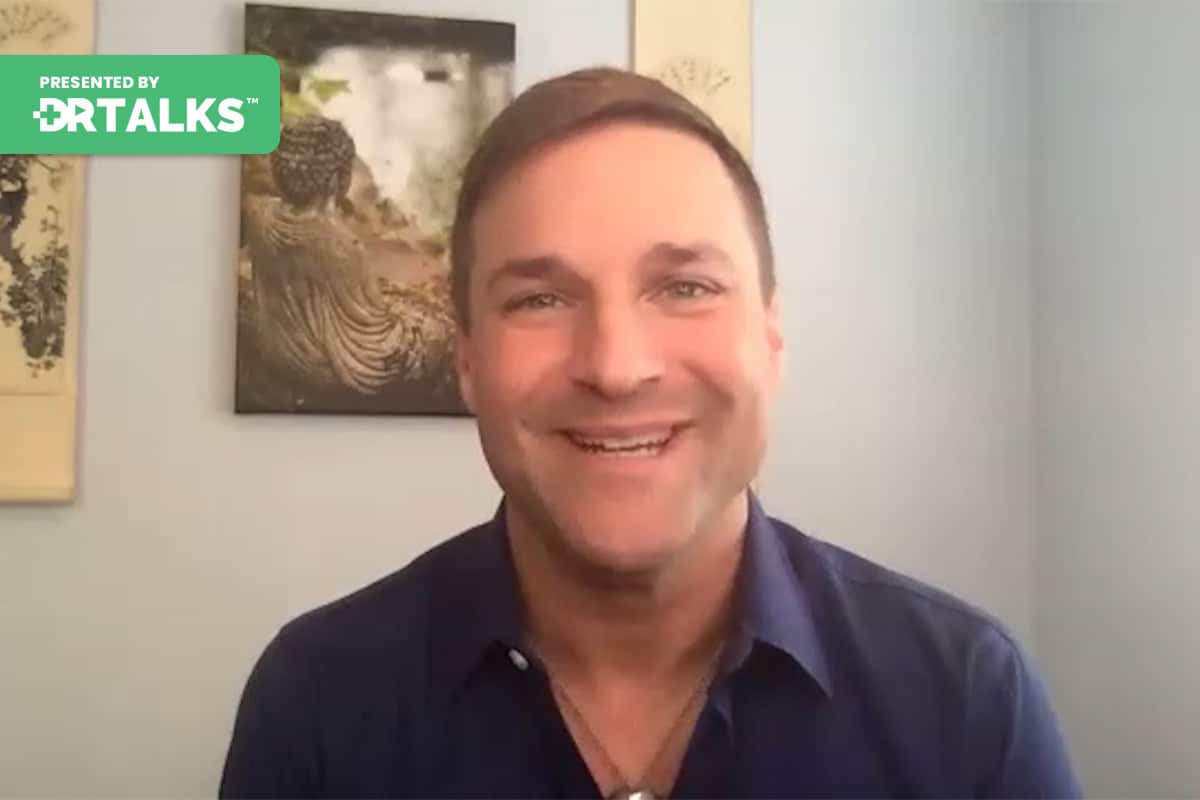Join the discussion below

Wendie Trubow, MD, MBA, IFMCP is a functional medicine gynecologist with a thriving practice at Five Journeys, and is passionate about helping women optimize their health and lives. Through her struggles with mold and metal toxicity, Celiac disease, and other health issues, Dr. Trubow has developed a deep sense of... Read More
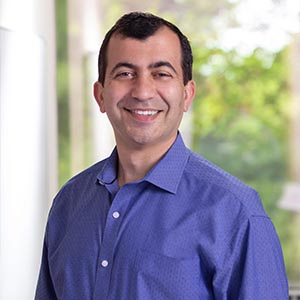
Edward Levitan, MD, ABIOM, IFMCP
As a double board-certified physician, I don’t just focus on the physical symptoms of my patients. I believe that their overall well-being is a result of the harmony between their body, mind, and spirit. My extensive training in both traditional Western medicine and Eastern practices like acupuncture and Shiatsu allows... Read More
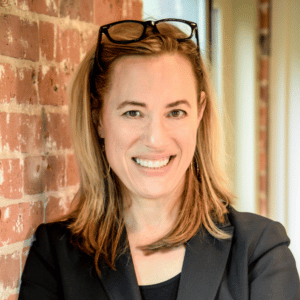
Kara Fitzgerald, ND, IFMCP, received her doctor of naturopathic medicine degree from the National University of Natural Medicine in Portland, Oregon. She completed the first Counsel on Naturopathic Medicine-accredited post-doctorate position in nutritional biochemistry and laboratory science at Metametrix Clinical Laboratory (now Genova Diagnostics) under the direction of Richard Lord,... Read More
- What is biological age, how does it differ from chronological age
- Top 5 ways to decrease our biological age
- Impact of toxins on biological age
Wendie Trubow, MD, MBA, IFMCP
Welcome to this episode of the Environmental Toxicants Autoimmunity and Chronic Diseases Summit. I’m Dr. Wendy. Trubow, MD, MBA and my co host is Dr. Edward Levitan, MD And we’re your hosts of today’s summit. And I say this all the time. Okay, because it really is true. I’m so excited for our guest today, who’s Dr. Kara Fitzgerald. She is naturopathic doctor. She’s a Functional medicine certified practitioner and she’s a clinical researcher on the impact of diet and lifestyle intervention on your DNA methylation, which we’re going to dive into. She’s the author of younger you reduce your bio age and live longer better. She’s on faculty at the Institute for Functional Medicine and as an IFM certified practitioner who regularly lectures internationally and hosts the podcast, New Frontiers and Functional Medicine. Welcome, Kara, thanks for being here.
Kara Fitzgerald, ND, IFMCP
Yeah, it’s great to hang out with you guys again.
Wendie Trubow, MD, MBA, IFMCP
I know you can go first, you can go first.
Edward Levitan, MD, ABIOM, IFMCP
Well, I’m excited because I learned so much when we first talked. So I’m looking to dive in and really like get, get into it. So I guess let’s start with just fundamental of what is biological age.
Kara Fitzgerald, ND, IFMCP
Yeah. Yeah. Okay. So, we have a chronological age, right? Or trips around the sun we’ve taken,
Wendie Trubow, MD, MBA, IFMCP
I am a full deck of cards, Kara. I just turned 52 and I am playing with a full deck of cards this year, playing with a full deck of cards waiting on that one said nothing.
Kara Fitzgerald, ND, IFMCP
That’s funny. Yeah, you can’t do anything about it, you know, you can’t be 29 again. However, we can do a lot about our biological age and that’s how rapidly or slowly, ideally, we’re physically aging, biological age is infinitely more meaningful than chronological age. And as we enter into this era where we’re looking at being able to reverse it and slow it down, that’s going to be the number that’s more important to us that will supplant chronological age, chronological age will be way less important in the years to come.
Wendie Trubow, MD, MBA, IFMCP
You studied this, right.
Kara Fitzgerald, ND, IFMCP
Yeah. Yeah. And we’ve really just galloped forward, you know, just in our ability to look at biological aging and we measure it via something called epigenetic. So, specifically DNA methylation, and I’ll define that. Now, epi above genetics, your genes, your D N A, um we mapped out the human genome in 2003 was, was when we completed the project about, and we really anticipated being able to identify genes that caused diseases. That was the goal that the mapping of the genome would provide a rosetta stone for our ailments. And what we learned really pretty quickly was that it didn’t at all.
And I think that that was, you know, there was a clear disappointment in not having that rosetta stone, but it ushered us into what regulates our genes. And this is epigenetic. So that the variables how, how we live, how we, how we breathe, how we are in the world. And there is a, there is a heritable component we can talk about but it plays a much smaller role. But it’s really us in our day to day choices that influence what genes are on and what genes are off. And it’s in this, in the epigenetic space that we can look at the rate of biological aging and that’s how we measure it and we measure it via one specific mark called DNA methylation.
Wendie Trubow, MD, MBA, IFMCP
Can I do this test? I wanna do this test.
Kara Fitzgerald, ND, IFMCP
Yeah, you sure can.
Wendie Trubow, MD, MBA, IFMCP
How do I get this done?
Kara Fitzgerald, ND, IFMCP
Yeah, you can actually get it on our website. We are, we just started to offer the pace of aging. Which is, I don’t want to get too arcane. So just stop me if I am. It’s a third generation biological age clock when I did, I’m supposed to be telling you about my study when we did our study, which was in 2018. It was not long ago.
Wendie Trubow, MD, MBA, IFMCP
It was a million years ago in terms of,
Kara Fitzgerald, ND, IFMCP
That’s so funny. It’s actually a very rapidly accelerating biological age. Yeah, we did it back in 2018, which is like the dark, the dark ages. And we only, we published in 2021 you know, way back in 2021 there were only first generation biological age clocks at that time. The new, the earliest iterations and, it was, it’s, there’s still amazing resources and they’re still used today, but we’re currently very interested in something called the pace of aging, which is a snapshot into how rapidly we’re aging. It doesn’t provide a biological age number, like my bio age and the last time I tested it, it was 41. I’m 55 my bio age is 41 which is good and, you know, I’d like to keep it as low as possible. But the pace of aging, if you’re aging at a pace of one, then you’re consistent with your chronological age. You want to be less than that.
And my pace of aging is about 10.8 point eight plus a couple of digits. So it’s less than one and that’s, and that’s great. And that’s the third generation clock, Which is just very highly respected. So we’re, you know what, that’s so it can get as low as .6 and that’s not, that’s not seen in its, I think that it’s mostly limited to younger individuals where you’ll see a slowdown to that extent. So, I think that is unfortunate. Well, you know what, like for the time being, give us a few weeks, we’ll figure out how to crack that down. Yeah, I think about, I think in point in the, in the 0.0.7 to 0.88 range, you’re, you know, you’re doing really well.
Wendie Trubow, MD, MBA, IFMCP
Can you talk about your study just so the listeners can understand what you started with. And
Kara Fitzgerald, ND, IFMCP
So the question, the question for us, we had a handful of questions, but we wanted to see whether we were influencing a diet and lifestyle intervention that was designed specifically to sweet talk epigenetic. Like every piece of this intervention was designed around optimizing gene expression. And specifically something called DNA methylation. Could we within eight weeks time show a favorable change to biological age to epigenetic expression in general as compared to a control group who didn’t have any intervention? Remarkably. And I have to say, I, when we started our study, we were looking broadly at epigenetic optimizing epigenetic expression. At that time in the dark ages of 2018, there were no studies out there showing that that biological age could be slowed down or reversed. There, there were no studies demonstrating that at that time. So I didn’t go into the study thinking, you know, cavalierly and really cocky that sure our diet lifestyle intervention will, you know, knock this back. I was not at all. So it was part of the exploratory arm of it. But there’s no evidence, in fact, the Horvath Steve Horvath, the developer of that first clock we used did not think that bio H was reversible. I mean that it was very clear on that. And then in 2019, the very first study came out and it was just a super small study of nine men.
And it was a yearlong intervention of growth hormone injections and some other interventions and they reversed bio age and that your long intervention of, you know, by over two years, by 2.5 years. And that stopped the presses, that stopped the scientific process. They were published in aging cell, which is a good journal, but they were, you know, written up in nature. I mean, the very tippy top journals were incredibly interest even though it was only nine men and there was no control group, but it was a revolutionary, revolutionary. So that was the first study. Ours was the I think the third, I think that there was one interim trial and what we showed was as compared to our control group. The biological age in our study participants was, was slowed down by 3.23 years. But that’s pretty remarkable.
Wendie Trubow, MD, MBA, IFMCP
And so curious Kara, because when you think about this, we’re going to talk about all the things that impact your biological age and your epigenetic. But did you ever, at any point, were you able to pinpoint o out of the six things you can do? There’s one, that’s like the most, you know, like people would argue, oh, meditation or movement. Is there anyone that you could say the data looks like it’s this one versus,
Kara Fitzgerald, ND, IFMCP
Such a good question? We can’t really tease it out. Our study participants were quite adherent. We, they worked with our nutrition team. The nutritionists act acted as their coaches. So they were basically, I wanted them to these, I wanted our nutritionists to stick to the study participants like glow, this was a really important study and it was, you know, expensive to run it and I wanted them to adhere. So I think that they stuck with it. The, it took us a long time to recruit people who were, you know, willing to do the intervention. That said certainly the diet is, you know, fairly rigorous and was a big change for some folks, even though these guys were healthy, they are healthy.
The diet, you know, just being very dense in the nutrients to regulate gene expression was different for some of them and we can talk about those details as well. So, I mean, you know, diets a heavy lifter, right? I mean, we know in clinical practice that diet can be the main intervention the main game changer. So I mean, if somebody asked me, I would land with the nutrition intervention. However, I was pretty blown away by the role that stress plays the role that chronic toxic stress. Not a little burst of, you know, hore medic stress that’s very empowering and cleansing. But this chronic toxic stress that we’re exposed to in this, particularly in this country and, you know, just in our lives. And
Edward Levitan, MD, ABIOM, IFMCP
So because it’s the
Wendie Trubow, MD, MBA, IFMCP & Edward Levitan, MD, ABIOM, IFMCP
Environmental Toxicants
Edward Levitan, MD, ABIOM, IFMCP
Summit, tell us about that.
Kara Fitzgerald, ND, IFMCP
So the, so the clock that we used in our study, a full 25% of it is regulated by glucocorticoids. It has glucocorticoids response elements. Basically what that means is that I think that we could summarize it as stress being cortisol really driving biological age like hardcore big time 25%. There’s no other variable on the clock that has such a power, such an impact. So it’s huge. It’s huge. I mean, does that mean that stress is number one? And we’re not appreciating it to the extent that it dwarfs anything else?
Wendie Trubow, MD, MBA, IFMCP
Well, I’m curious about the people like the next your, your second or third or 18th generation of study, which is you do the eating program, but you don’t do anything around stress. And what does that do to your biological age versus doing the food and the stress reduction.
Edward Levitan, MD, ABIOM, IFMCP
But the challenge is stresses everything right? Because it is what you eat or not eat. It is what, how you exercise or not exercise. It is how your emotions happening. It’s what your ancestors and what like everything. So it doesn’t surprise me because there’s no one thing.
Wendie Trubow, MD, MBA, IFMCP
Well, but I think you’re talking about the talk, we’re talking about the effect of unmitigated chronic cortisol expression from toxic or stressful environment experiences. Thought. Yeah, it’s kind of big. You can’t even, it’s hard to take it out.
Kara Fitzgerald, ND, IFMCP
You know, you’re absolutely. I mean, I think your question is awesome, Wendie. You know, to consider just isolating each variable. I would love to. I mean, if I had a lab and a lot of, a lot of grants I would have but, you know, I’m in clinical practice. That’s real life and, you know, like, yeah, I mean, absolutely to your point. Yeah.
But I mean, we could tease variables out and pretend that we’re actually doing something meaningful and publish on it and they provide some interesting information. But yeah, you’re right. I mean, you know, we Are, you know, to your point, our self-talk can put us into fight or flight in incessantly all the time. Yeah, there’s so many ways that we can hide out.
Edward Levitan, MD, ABIOM, IFMCP
Let’s say you have 10 people, 10 quote unquote healthy people. Some of those people need to exercise, some of those people need to go to therapy, other people need to stop the sugar,
Wendie Trubow, MD, MBA, IFMCP
You layer it you start with time zero and you layer on the food, you measure the impact you layer on the stress reduction, you layer the impact you layer on the extra. You just keep measuring data, data, data.
Kara Fitzgerald, ND, IFMCP
We are continuing, we’re continuing to research it. We do have some, we’re going to publish a case series soon and this is looking at women. So our original study was in men only. And that’s because when middle aged women would be pre menopause peri. And yeah,
Wendie Trubow, MD, MBA, IFMCP
That’s our next book here. A sweaty and bitches coming out.
Kara Fitzgerald, ND, IFMCP
That’s so funny. So we did our first study in men then we haven’t, we have a nice little group of, of women. They were the first adopters, the earliest adopters to the program. So these were the first group to finish the full eight weeks to get there baseline and their follow up in this group of six women and they just, they did fabulously well. So that’s nice to see. We’re bringing it, we do it in clinic practice. We’re going to bring it in and study it. So we’ve got an I R B and we will look at individualized. So to your point, Wendie, you know, just breaking it up and, and structuring it in a way that we’re optimizing it for that particular human sitting in front of us. My guess is that we might see better outcome with an individualized structure. I mean, why wouldn’t we, you know, using a functional approach but using the, the younger you principles. But we’ll see.
Wendie Trubow, MD, MBA, IFMCP
What did you tell the people who struggled with forming new habits? Because it’s easy to say, eat like this, but it’s much harder to live for eight weeks and, and the goal is not just eight weeks, right? This is like this is your new normal, keep going. So what do you say to people who have it?
Kara Fitzgerald, ND, IFMCP
I got funding for this baby. You are staying, this is going to psychically follow you around. Yeah. Failure is not an option on this.
Edward Levitan, MD, ABIOM, IFMCP
Sometimes I want to plant a little something my kids and like if they’re not behaving.
Kara Fitzgerald, ND, IFMCP
Yeah, that’s right. Yeah. Yeah. Non adherence is just simply not an option books. People we I think that we were well, it took a while to recruit, it took a full year to recruit for an eight week study. We had to use a rolling enrollment Because we had to get people who were actually interested in engaging in it. Where should they be chosen for the group? And so it did take us a little while. They were very, very healthy cohorts. So we wanted healthy men and these guys were particularly healthy. So they were already, they had already moved along the continuum of change. Our study participants. It took us a while and they did that no 100%. The coaching element was a essential. I just, well, I want to write that up because we haven’t here in State A and, and they look really fabulous, but, you know, we’ll just have to compare it to, you know, something, something else.
I think nutrition studies are notoriously, you know, poor because adherence is so sketchy and people sort of fabricate what they did. And you know, I would like to speak to that into the benefit of coaching. So, coaching for sure helps. But so once we launch the book, the study is different, our clinic practices, different people come to our clinic practice, kind of ready to dive in here as well. But out in the world now that I’m bringing this into the world, I’m encountering a total a different group. And I think it speaks more to your point. Bringing these changes into the world, I would say that there’s a lot.
So, so epic nutrients eating for gene expression, there are you already eating for gene expression? So one way we can talk about it is that surely there are foods you’re consuming on a daily basis that act favorably on your epic genome. So let’s start simply with things that you’re already doing, right? And then slowly build on that. We haven’t, we have a sort of an entry level program, we call it the younger you every day. It’s not quite as rigorous as the intensive. And we can start there with people. So I think to your point, Wendie is that let’s meet the human being sitting in front of us and, start on this journey with them. You know, what are you willing to do for exercise? How do you develop a good exercise habits? What do you, what elements do you need? I think about my sister, who doesn’t like exercising and when, and I do. So we talk on the phone a lot and that will get her going.
And she’s like I did to, you know, to traipse around the block and she’s super psyched and, or maybe she’ll go to the trim and we’ll be talking and she’ll be driving to the gym and she gets her workout in and we get to connect. So I think community, in fact, let me tell you something really cool. So exercise is incredibly important for biological age reduction. It’s one of the very clearly well studied interventions if you will, that we can do that will extend life. It won’t just present to prevent disease, it does prevent disease, but it will tack years on your life. So, we need to figure out how to do it. And one of the cool things is that Mayo published a few years back that community based exercise might, you might actually get a few extra years. So that connection, there’s an Oxytocin with the release with the community. Plus the benefit of the exercises and, and the number one, the number one sport was tennis followed by, I think, like soccer. Yeah, I’m a cyclist. I’m sort of a loner. But,
Wendie Trubow, MD, MBA, IFMCP
Well, you could do a spin and you can do a spin class. But, but it’s also, you’re sort of alluding to Dan Buttner’s work on, on the blue zones and things, community and an active lifestyle and healthy eating program. I despise the word diet. So I never use it because it implies temporary and you have to die to do it. I don’t like that. So you know, you mentioned epigenetics. Are there any studies that look at epigenetic changes in your health? And what happens downstream for what happens from your grandparents, great grandparents, any of that?
Kara Fitzgerald, ND, IFMCP
Yeah, I mean, there is definitely a heritable component. So, yeah, and there’s yes. Yeah, that’s right. We definitely pass that information on to our kids. So most of our epigenetic information is removed during embryogenesis, but about 30% has been estimated to stay. We, yeah, so we can pass on information about our exercise habits. You know, your kid could be born with rock hard abs. I don’t know. I just think that’s so funny or not. Yeah. Yeah. Yeah. Yeah. So, yes. So I just in, in human studies, we see the influence of food. So the best actually and there’s, and there’s actually stress. So holocaust offspring of holocaust survivors has been investigated. World Trade Center, offspring have been investigated and then, you know, starvation exposure to change in the amount of food in humans has also been investigated starvation or excess food intake. Both either side, either side, serious starvation and excess and, and robust food intake like a good harvest, not eating mcdonald’s and Krispy Kreme just, you know, more caloric availability.
Both of those result in increased diabetes, increased mortality from diabetes, increased cardiovascular disease, etcetera dot obesity, both of those in subsequent generations, which is pretty interesting and that’s, that’s mediated via epigenetic changes in the starvation. cohort, there’s something called the thrifty epic genome type that kicks in and so they hang onto every calorie and that those epigenetic changes are passed down through the generations. But you know, there’s a, there’s a different epigenetic change that happens in the X generation zero, excess calorie intake, but it still results in the same phenotype IQ changes of obesity, metabolic. Isn’t that interesting?
Wendie Trubow, MD, MBA, IFMCP
You mentioned something offline before we started about each subsequent generation got worse. The circling the drain therapy. Talk to us about that. That was so cool,
Kara Fitzgerald, ND, IFMCP
Persistent organic pollutants exposed to in generation zero. This is an animal model. So they exposed them to some toxins that we all have burdens of and it changed the epigenetic on the sperm and subsequent generations had the toxin associated diseases, but they were actually amplified by generation. They actually got worse. It is crazy. It’s crazy. And it’s, yeah, it’s scary.
Wendie Trubow, MD, MBA, IFMCP
So okay. There’s so many questions I have from this but one is if we’re all that generation because we’re all exposed to this ongoing lee, so what are some of the things I think? I think food is so impactful because you have control over your food most of us. And so, I mean, to some extent, right? So, are there foods that people can eat that impact their ability to get rid of the P O P S A persistent organic pollutants and alter their own epigenetic so that the generations are passing on. Don’t do that as much.
Kara Fitzgerald, ND, IFMCP
So clearly, we have to continue to study this. You’re asking really important questions and things that will be able to, you know, will answer with more and more human data. But I would but yes, I mean, the answer is yes. So there’s, there’s a scientist at the University of Kentucky who I would love to podcast with you. You should podcast with him. His name is Bernard Hennig, University of Kentucky and he studies the impact of nutrition on the physics of and toxins physiological impact of nutrition. And so he’s shown awesome heartening stuff like consuming fish, you know, fatty fish, getting E P A and D H A will offset the pro inflammatory pathology of persistent organic pollutants. It’ll just get in there and cut it off at the chase because, you know, persistent organic pollutants or PCBs actually turn on the whole or academic Carcinoid cascade, you know, they turn up the volume on those prostaglandins that we know in clinical practice, most of our patients are struggling with and we give them fish oil to inhibit that.
So PCBs do the same thing, they turn this on and we know how to interrupt that. So it works. And similarly, he shows with polyphenols, you know, green tea and others having a interrupt, interrupted effect on toxins are our program, I just want to say is dense with all of those important polyphenols, those detoxing compounds that can interrupt that burden and, and what’s interesting. So not only are they going to influence us, you know, getting rid of those toxins, but if we have the imprint of our, of the toxins on our epic genome, so maybe not the toxin itself from generation zero, but the imprint, the damaging change to gene expression, these compounds are able to sweet talk gene expression. I mean, that’s what we showed in our study that our participants changed the there the pattern of gene expression towards a more youthful, younger pattern, they rearrange. So the diet and lifestyle interventions arranged, you know, gene expression patterns within our study subjects. So we should be able to, you know, do that with, with toxins,
Wendie Trubow, MD, MBA, IFMCP
Kara, that’s the title of your next books. We talk your genes right there right there. We talked your genes. So, basically what I’m hearing is you can eat your way out of it. You can eat your way deeper in and you can eat your way out of it or mitigate it.
Kara Fitzgerald, ND, IFMCP
But wait, there’s more. Oh, I love this.
Wendie Trubow, MD, MBA, IFMCP
No. Talk to me. Talk about.
Kara Fitzgerald, ND, IFMCP
Well, I want to say that, you know, if I was to pick the ultimate nutrient that sweet talks your genes profoundly, it would be exercise. I mean, well, exercise acts, exercise, exerts the same mechanism. So our diet as you’re right, I shouldn’t call it a diet or eating the eating pattern that we prescribe as something as a bunch of something of, of nutrients we call methyl donors. Foods that include these methyl donors, our beets eggs, they have choline liver, greens, seeds. So those so packed with metal mushrooms actually really good source. But then it has these methylation adapted Jin’s green tea, turmeric, berries, citrusy sauce.
And these polyphenols work with the methyl donors and help optimal gene expression and they help to turn genes on that we want on protective genes, anti-inflammatory genes that help us inhibit pro inflammatory genes, genes that drive cancer, etcetera. So they do this rearrangement, the nutrients together exercise as a single entity does. Both of those exercise will actually lead to hyper methylation and inhibit inhibition of bad, of bad genes and it will re express inhibited genes. It will, it will take the methyl groups off. I mean, it’s, it’s just really extraordinary. I mean, there are some nutrients, there are some nutrients that can do that too. Like, you know, curcumin is sort of a tumor. It’s a super special nutrient, even soy, like a very organic soy. I don’t advocate a lot of soy eating books. Some of those polyphenols are just potently interesting in their behavior.
Wendie Trubow, MD, MBA, IFMCP
Do you hold on? Wait question, question on the field. So with the soy because I get such a bad rap, but I’m like, you know, in moderation and for its organic, I don’t know that I would go too crazy about that. So, so are you talking about edamame like the actual soybean or are you talking about soy milk or are we talking about tofu? Like, what’s the form we want?
Kara Fitzgerald, ND, IFMCP
Yeah. There are some really good soy milks out there. Yeah, I’m not, I don’t want to vilify soy either, but I want to make sure people are not eating GMO and ideally maybe, you know, they’re consuming something that’s fermented. It is antigenics. So if you’re sensitive to it, if you tend to have allergies and you’re reactive to soy, obviously, it’s not something to consume for that reason. You wanna, you wanna consume soy that has so organic, ideally fermented and it has those polyphenols present. So, you know, some kind of a tofu or a temp, edamame would have it. I don’t know how much we would have to see, you know, some soy milks would actually measure. So you would just want to look on the product and make sure
Wendie Trubow, MD, MBA, IFMCP
It’s not fermented. So it’s
Kara Fitzgerald, ND, IFMCP
Right. But it’s just right.
Wendie Trubow, MD, MBA, IFMCP
I mean, it’s green. Okay. And you mentioned exercise when you say exercise, what do you mean?
Kara Fitzgerald, ND, IFMCP
Good, good, good question there to the exercise studies. Looking at EPA, genetics are, you know, they’re different, there’s cardiovascular exercise. There was actually a pretty cool study where they would, I don’t know that I would want to participate in it but they just, they had participants exercise one leg on a bike, only muscle biopsies and then, you know, on both legs and really interesting changes to metabolic expression, muscle mass, etcetera. So, exercise that we used in our study was, very simple. Do what you love, do it for a minimum of 30 minutes, five days a week, really important to do something that you’re into perceived exertion. So you don’t have to wear a fancy monitor. You don’t have to measure your heart rate and anything like that.
You just need to go to 60 to 80% of your maximum perceived exertion. So 60% is you’re still carrying on a conversation. You might be sweating a little bit, but it’s not crazy. You know, your it’s great. Me and my sister talking with, she’s walking around the block. She’s probably at 60% easy to do. You ramp it up a little to 80% then maybe there’s a noticeable, Breathing change and you might be sweating a little bit more, but it is still doable and you should still be able to carry on a conversation. And that’s it. 30 minutes, minimum, five days a week. Whatever works. And that’s what we prescribed.
Wendie Trubow, MD, MBA, IFMCP
And what about stress management? I’m sorry, I’ve asked all the questions I’m like, really into this and I know my mortality is weighing very heavily on me this year. I don’t know what it is. It’s like, it’s so in my face, I’m like, what can we do every year? I’m like, what a gift cards. But I’m over 50. You know, I’m in like the second half of my life. If I’m gonna live to 100. I know I don’t have a full half life,
Kara Fitzgerald, ND, IFMCP
You know, as a side note. What, interesting as I’m in my fifties that there is an aging conversation. Almost a hypnosis that absolutely has to be squashed. I had, I did some over training for a while. I was doing a lot of reason training and I still do it. Love it. Muscle is important for longevity big time. But I overdid it and, and I was sore and I needed to take time off and it’s pro inflammatory and pro aging, by the way, too much exercise is pro inflammatory and pro aging. So I chilled out. You know, I’m, I’m restructuring, I’m regrouping. I’ll continue to do it because it’s important. But I’ll just do it a more balanced way. But my mom, I, you know, I love her. Oh, you’re just, you know, you’re getting old. Kara and I’m like mom. What does this mean? Does this mean that I retire to the couch? That’s it like no more.
Yeah. And it occurred to me that there’s a certain time when that can become a story that becomes a story and it becomes a story. Like I would have never said this. I mean, I had knees, I had to build my quads when I was a young cyclist, I’m a bike rider. I wouldn’t have told myself in my twenties. It was because I was old. You know, I just had to build my quads up. So there’s so we kick into this story this and, and you know, it’s a toxin, it’s a pollution. We kick into that, which is absolutely absolutely unhealthy.
Wendie Trubow, MD, MBA, IFMCP
We reject it.
Edward Levitan, MD, ABIOM, IFMCP
How many people do we see on a day to day basis that come in have that story?
Kara Fitzgerald, ND, IFMCP
Yes, I’m old
Edward Levitan, MD, ABIOM, IFMCP
And it’s real and at least in our practice, I’m sure in your practice, I’d say a third of the time that I’m talking to people I’m having is all about reframing that because okay, so you’re 60 and
Wendie Trubow, MD, MBA, IFMCP
You can’t really say your patient, what’s your point? But what we do try to save them is
Kara Fitzgerald, ND, IFMCP
That so empowering when you say that though.
Wendie Trubow, MD, MBA, IFMCP
Right? Well, we reject the conventional wisdom that you’re supposed to fail every year. Get worse every decade and die in your bed, decrepit of your mind and body. We reject that flatly.
Kara Fitzgerald, ND, IFMCP
Absolutely. The absence of that is not the presence of vitality. So you could say our, yes, we say that you’re meant to be vital, vibrant, healthy, able to participate in and interested in intimacy until you’re at least 100 and that every decade you improve.
Edward Levitan, MD, ABIOM, IFMCP
How many people, how many people do? Yes, there are tons and tons of decrepit, older people in the messages
Kara Fitzgerald, ND, IFMCP
They’re supposed to be. I mean, and from the medical establishment, I mean, you are, you know, you’re going against the grain with your, you know, the mirror that you’re holding up. I mean, it’s just so important.
Edward Levitan, MD, ABIOM, IFMCP
And doctors, if you look at the regular doctors to treat this
Kara Fitzgerald, ND, IFMCP
Because you’re old, right?
Wendie Trubow, MD, MBA, IFMCP
Expectation drives reality. In a lot of those cases,
Kara Fitzgerald, ND, IFMCP
There is, there is a hypnosis like this, fog that kicks in, it’s old, you know, and then this resignation that comes with us and you will in fact become old if that is your mindset. I want to say that there’s cool research coming out these days actually like in the last month two studies. One looking at biological age and sent French centenarians and they are like almost 30 years younger than, than in their biological age. It’s just, it’s very, very cool. So 100 is the new 70 and then I’ll take it and then they looked at women. I think it was from the women’s health initiative data. So, here in the U S women who were 90 and older without physical issues, without physical limitations, without cognitive decline were significantly biologically younger than women who had physical issues or, or either physical issues or cognitive decline or both. So it’s just validating, you know, the whole biological age tool, it’s utility. But it definitely
Edward Levitan, MD, ABIOM, IFMCP
Goes to the same thing of if you have chronic disease, okay, that’s all you get. Like it’s not, we don’t look in conventional medicine, you’re not looking at how do you reverse it? You’re looking at how can you deal with it the best you possibly can. And on our side, we’re like, okay, you have to see, let’s reverse that and let’s get you healthy and vibrant like,
Wendie Trubow, MD, MBA, IFMCP
Well, there’s even more to it that if you’re in the bucket of auto immunity and chronic disease and aging, if you’re in the aging bucket or degeneration and you’re, you’re going backward, you can alter the course of the future with these things, your food, your movement, your stress management, your sleep, training your brain and resetting your expectations, your future changes.
Kara Fitzgerald, ND, IFMCP
Yeah. That’s, that’s exactly right.
Wendie Trubow, MD, MBA, IFMCP
You can heal your way out of these things.
Kara Fitzgerald, ND, IFMCP
Yes. And we, and if you get into the chronic disease, I think if you buy into the chronic disease, slippery slope, if you buy into this aging phenomena, you know, one disease begets another disease begets another disease. I mean, most of us in the us have to, by the time we’re in our early 60s have to significant diagnoses and one begets another. I mean, it’s just, it is crazy and it absolutely doesn’t have to be. And we are driving that car. I mean, we do have, have a choice to reverse that whole, that whole journey.
Edward Levitan, MD, ABIOM, IFMCP
Yeah, I mean, we do accept the challenges, the majority of people, there’s no education because the doctor knows everything the doctor says. You need a pill if you’re gonna have high blood pressure and your old and, and you got to listen to the doctor as opposed to taking things into your own hands and really doing some research and finding out and yeah,
Kara Fitzgerald, ND, IFMCP
Or they happen upon you and the work that you’re doing, which is, that’s just a fabulous, you know, or they happen upon us. We’re a little bit more like we’re sort of boutique and people end up getting referred to us and it can take awhile but,
Edward Levitan, MD, ABIOM, IFMCP
Well, the more practitioners that do this work, the more this gets out and the more this becomes the normal.
Kara Fitzgerald, ND, IFMCP
Yeah.
Wendie Trubow, MD, MBA, IFMCP
Well, I mean, I was just thinking about there’s two things when you’re exercise. I mean, there’s a million things when you’re exercising, but when you’re exercising you’re increasing your mitochondrial product production, which increases your energy directly and you’re also increasing the BDNF. And I just remember brain derived, neutral something factor and now here’s like the limit of my knowledge. But I know that this is good for healing.
Kara Fitzgerald, ND, IFMCP
Yeah. Yes, absolutely. Absolutely. So let me also say that if I didn’t, I may have so not only does it very actively re re arrange an expression to something favorably. In fact, scientists now are positing the idea that the way exercise mediates, it’s amazing, you know, influence on mitochondria and, and, and BDNF. You know, all of these things is via epigenetic changes and exercise as I said earlier, whether we’re doing it or not, that inference, that information is something called the, the, the imprint. And that’s the region of the EPA genome that gets handed down. So your exercise information is given to your kid and it influences metabolic health, it influences certain chronic disease risk, it influences muscle.
Wendie Trubow, MD, MBA, IFMCP
I think we did our own little study in our family because we have four kids and, and my health altered significantly in a good way from the first kid where I had undiagnosed celiac disease. Then I got healthier because I was no longer a resident I still had undiagnosed Celiac with the second kid, but I was no longer having this toxic lifestyle. And then the third kid I knew I had celiac was very compliant, was getting healthier, had more brain space and time to move. And then on to the fourth kid when I really started to feel like I hit my stride and, and it’s so interesting to watch in their health because I mean, the first one was a severely growth restricted primi so she got handed harder deck of cards than the others did. But it’s very interesting to watch their different bodies and the way they respond to things and resilience. And it’s just kind of cool.
Kara Fitzgerald, ND, IFMCP
That’s extraordinary. Wow. What a journey.
Wendie Trubow, MD, MBA, IFMCP
Built in study.
Edward Levitan, MD, ABIOM, IFMCP
Well. Have different genetic. No. But yes.
Wendie Trubow, MD, MBA, IFMCP
Well, no, I mean, I have two copies of everything. So they all got to go halfway.
Edward Levitan, MD, ABIOM, IFMCP
Do you know, they don’t require genetic testing when you get married?
Wendie Trubow, MD, MBA, IFMCP
I should not have reproduced based on my, know,
Kara Fitzgerald, ND, IFMCP
Your kids are awesome with what, you know,
Wendie Trubow, MD, MBA, IFMCP
Now knowing that we didn’t know that.
Kara Fitzgerald, ND, IFMCP
Yeah.
Wendie Trubow, MD, MBA, IFMCP
Well, no, I mean, it really does because the first set of kids we did not restrict their gluten, even though I had Celiac, they got gluten in school and by the time they were like three and five they were both severely sensitive to gluten. The younger two we recognized, oh, nasty gene pattern. Terrible epigenetic six mother with Celiac uncles with Celiac, grandfather with Celiac gluten is not a good idea. So, we didn’t, the little, the little don’t get gluten and they’re like, we’re not sensitive. I’m like, let’s keep it that way with my jeans. You’re headed that way.
Kara Fitzgerald, ND, IFMCP
But you absolutely followed, you know, you followed the structure. I mean, if, if kids don’t have the gene or actually they could have the genetics but if they don’t have the antibiotics. yeah. You know. So it’s, yeah, what, it’s, what a journey, what a learning journey.
Wendie Trubow, MD, MBA, IFMCP
It’s been great. Tell me about what happens after this study. Do you keep in touch with this group of men? It still burns my butt. But I understand why you keep in touch with these men after the study to see how are they doing? Did they maintain it? And do they, do they get to do this D N A test?
Kara Fitzgerald, ND, IFMCP
So they did, they got, they did during the study. I haven’t, no, I didn’t build into our I R B, the, the structure to have continued involvement with them. And I really, I kind, I wish that I did, I wish that I had had the hindsight, but again, we didn’t know. I mean, this was like the first study of its kind at all in this model. I mean, nobody was looking at a human control diet and lifestyle intervention on epigenetic. Like, so we didn’t, we didn’t have all of the foresight that we do now. So I wish that I had built it in so that I could watch them. I had no idea what we’re going to see. I mean, I was like, I hope we changed, you know, that was pretty cool. Little did I know that we, that we, you know, not only did we reverse the clock, but we actually changed what they call differential methylation. We profoundly change Methylation on our study subjects as compared to controls and something like 8000 genes like big time,
Wendie Trubow, MD, MBA, IFMCP
which means
Kara Fitzgerald, ND, IFMCP
8000 methods.
Wendie Trubow, MD, MBA, IFMCP
Like what does that mean?
Kara Fitzgerald, ND, IFMCP
Well, I have to, I have to drill into it. So we turn genes on and off way differently in our study group than the control group. And I have to drill into that data. But I can tell you that my early look at some of them is we’ve turned on some tumor suppressor genes. So turn to suppressor genes, those really important genes that protect us from cancer. Part of aging is that we turn them off. I mean, it’s like this rock, like aging has some predictable changes that we don’t want to allowed to happen. And one of them is turning off tumor suppressor genes. And I can see that we change to suppress tumor suppressor methylation that we allowed them to come back on in our study participants. But we, you know, stay tuned.
Like I have to do a drill into those, into those methylation patterns and then, you know, write a paper on it. Yeah, it’s, it’s really exciting but we were going somewhere else and I kind of digressed. What was the question? Oh, whether I stayed in contact with them with a minority of them. So, what we, what we did, including the I R B was that we would, they could go to a Facebook page and hang out with us there and we would enact, interact with them there and a handful of them did. The challenge was that we, it since it was a rolling enrollment, we were collecting data over the full year.
And so it was only like the final crew of, of guys that were a little bit more engaged with us. It was hard to get the people who were there at the beginning. It was just, yeah, you know, hindsight is, is definitely 2020. But yeah, those guys were doing well and the people that we were in contact with absolutely adapted. Some of these, you know, they let themselves move towards, you know, one guy really liked beer and I know one guy loved rice. And so they let themselves have you know, some things that they liked, but it really profoundly influenced to those that we were in contact with.
Edward Levitan, MD, ABIOM, IFMCP
Yeah. Awesome. What else should we ask you that? We haven’t asked you?
Kara Fitzgerald, ND, IFMCP
What else? If people want to have their biological age tested. As I said, we’re doing the piece of aging and people can come to the website and actually get it. It’s not it’s much more affordable. God, I think we’re charging to 99 that includes 30 minutes with one of the nutritionists who are, you know, have this program in their epic genome. They know it. So the nutritionists have either that were either in our, in our current research or in the original study. So they really, really know this. So it’s 2 99 we paid over $1000 per test when we, when we ran it back in. Yeah, yeah, really expensive. But as, as everything happens in this Kind of Oh mixed revolution, these tests are dropping in price quite a bit, which is, which is pretty cool. So that’s still kind of high, but it’s way better than it was. I think we paid 1200 per.
Wendie Trubow, MD, MBA, IFMCP
That’s crazy. I mean, the thing that just so so striking to me is that, you know, we have a lot of experts on this summit and it really does all come down funneling into to prevent and reverse Autoimmunity, and Chronic Disease. There is a pretty consistent core set of behaviors that if you can do the majority of them every day, it’s going to help you and that’s eat in a way that’s devoid of processed food and super high in, in a wide range of minerals, nutrients, vital nutrients, protein to support your liver and detox fish oil. Make sure you move your body, sleep distress. And I would say what’s not listed in yours that I would add in is deal with your trauma just to round it all out.
Kara Fitzgerald, ND, IFMCP
Yeah. Yeah. That’s right. That’s right.
Wendie Trubow, MD, MBA, IFMCP
Yeah. Storage like yeah.
Kara Fitzgerald, ND, IFMCP
Yeah. That’s right.
Wendie Trubow, MD, MBA, IFMCP
It’s crazy. So, where can people find you?
Kara Fitzgerald, ND, IFMCP
They can come to the best would be for this information. Youngeryouprogram.com, youngeryouprogram.com. In fact, there’s a free bio age quiz so you can start there. You don’t have to invest in the test at all. You can just go and take the bio age quiz and see how you’re doing. You can get, you’ll get a printout of your results emailed to you and so you can look and see what you can do better, what you’re doing. Well for me sitting isn’t sitting as a pro aging thing. Hence my treadmill desk over there. Yeah. Yeah. Yeah. That was one of the areas I said too much. And so that was a lesson from our bio quiz. But you can go grab it, grab it, it’s free and then, you know, you’ll learn about what else we’re doing.
Wendie Trubow, MD, MBA, IFMCP
You’re doing amazing work for you. It’s always a pleasure to talk to you because you just have the coolest, you know, you’re, you’re in it. So it’s great to hear
Kara Fitzgerald, ND, IFMCP
And it’s great to connect with you. I enjoyed our first conversation and I was just really happy to see your smiling faces.
Wendie Trubow, MD, MBA, IFMCP
We’ll play, we’ll keep playing. So, Kara, thank you for joining us for this episode of the Autoimmunity, Chronic Diseases, and Environmental Toxin Summit. Really, it’s been a pleasure interviewing you. Everyone should be listening to this. It’s just fantastic. So, thank you.
Edward Levitan, MD, ABIOM, IFMCP
Thank you.
Downloads

